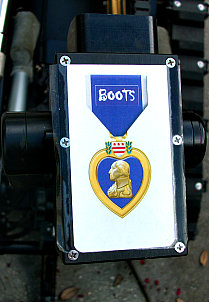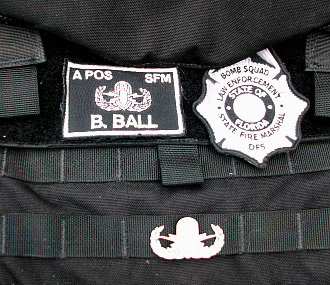Criminal Justice Careers | What's It Like To Be A Bomb Tech? Part 2
Investigating criminal justice careers? What does a bomb tech do and how does a law enforcement professional become one?

Investigating criminal justice careers? What does a bomb tech do and how does a law enforcement professional become one?


As a boy growing up in central Florida, Brandon Ball always knew he'd become a firefighter.
His father and grandfather were firefighters, both retired chief officers from the Avon Park Fire Department in Highlands County. That made the local fire station Ball's second home.
So there was never any question in Ball's mind that one day he would wear the yellow helmet and jacket of a firefighter.
For the past five years, however, he has donned a different kind of protective apparel – gear he would never have pictured himself in when he was younger.
The green and black of a bomb tech's suit.
Ball launched his career in public service as a firefighter followed by paramedic and fire investigator with Florida's Hardee County Fire Rescue.
With his sights set on becoming an arson investigator, he also worked with the Wauchula Police Department as a police officer and a detective to gain the prerequisite law enforcement experience. He then joined the Bureau of Fire & Arson Investigations with the Florida State Fire Marshal's Office as detective, moving up the ranks to his current position of law enforcement major.
Since 1995, Ball has participated in roughly 1,800 fire scene investigations that have involved commercial, residential, and motor vehicle fires – some fatal. As major, he oversees the southern half of the state, which includes over 50 law enforcement officers conducting fire, arson, and explosives investigations.
But it's his secondary role as bomb technician that still prompts the most intrigue and the most questions from Saint Leo students taking his online criminal justice classes in evidence gathering and preservation.
(Click here to see part 1 of this post. It includes a video of Ball demonstrating a sophisticated robot used by members of the Explosive Ordnance Disposal Unit. Squad members call the robot, Boots, and awarded it a "Purple Heart" after it was shot in the line of duty.)

I view fire investigation as a natural progression of my career as a firefighter. I was hungry to learn about fire and explosion investigations and figure out why they do what they do. Call it a natural scientific curiosity. I continue to find it a fascinating specialty.
In order to move into fire investigations full time, I was required to be certified as a law enforcement officer. I had to obtain at least 3 years of law enforcement experience before I could be considered for this specialty field.
My path was probably atypical. Most of our fire investigators come to the field with a heavy background in law enforcement. I took the long way around. But I feel it's made me a better fire/explosion investigator because I had first-hand knowledge of what fire was capable of from a scientific standpoint.
Our core mission is to investigate fires/explosions of suspicious origin and determine whether or not a crime has been committed. If a crime has been committed, we conduct the investigation to determine who did it and affect their arrest.
We're a relatively small agency with only about 105 sworn officers statewide, and we investigate about 4,000 incidents per year.
It's a fascinating field for anyone interested in what I would describe as a very unique field of law enforcement. It's extremely technical, scientific, and challenging, that's what drew me to the field.
We need to be up to speed on the scientific methodology associated with processing these scenes and then be able to articulate that in a report for prosecuting authorities.
Another challenge is getting our prosecutors up to speed on the technical aspects of who we are and how we conduct our business. It's important they understand that we function in a manner that is consistent with the scientific method – and that we follow commonly accepted practices within the fire investigative community.

It's one of the specialty units within our agency. There are only about a dozen of us statewide with extra duties as a bomb technician on four teams strategically located across the state. We are the only agency in Florida with statewide jurisdiction of explosive incidents.
Our bomb techs stay very busy as embedded members of local SWAT teams who use our skill set, technical abilities, and specialized equipment. We can remotely breach and make entry into environments during incidents such as barricaded subjects and hostage situations. The robots and bomb technician operators we bring to the table are invaluable from an officer safety standpoint.
With only 2,000 to 3,000 certified bomb technicians in the country, it's a highly selective field. Teams are usually part of local, state, or federal law enforcement agencies that hand pick potential candidates. So the first step would be to have several years of law enforcement experience and work for an agency with an accredited bomb team.
If the agency feels you would be a good fit, you would go through a vetting process. With the Fire Marshal's office, it's similar to an apprenticeship where you shadow a team for a year. If you make the cut, you would go through formal training.
All public safety bomb technicians (non-military) receive a five-week hazardous devices training at the same school in Huntsville, Ala. at Redstone Arsenal. This is a joint U.S. Army/FBI school. It's the only one in the country so there's about a two-year wait to get in. Since all bomb techs must be proficient in robotics, we also take a 40-hour robotics course at Redstone.
The ability to think on-the-run, natural curiosity, solid analytical skills, and good eye-hand coordination. You need to be disciplined, methodical and enjoy a challenge. You must be open minded and have the ability to think outside the box and not make assumptions that could put you or your partner in peril.
I was convinced that a master's degree would separate me from my competition as I began competing for promotions. I was right. I was well into my career, marriage, and family when I began pursuing my master's degree. I feel it set an excellent example for my children.
Continue with your education. It will separate you from your competition as you compete for jobs and promotions. It's an investment that will pay off later in life.
Are you a criminal justice major? What are your career goals?
Other posts you may be interested in reading:
Criminal Justice Careers | What's It Like To Be A Bomb Tech? Part 1
Criminal Justice Careers | What's It Like To Be An FBI Agent?
Exploring Criminal Justice Careers In Federal Law Enforcement
Image Credit: Saint Leo University